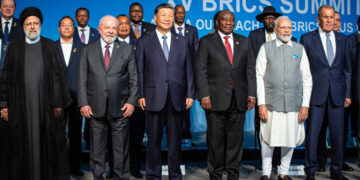Daniel Larison is a contributing editor at Antiwar.com and former senior editor at The American Conservative magazine. He has a Ph.D. in History from the University of Chicago. Follow him on Twitter @DanielLarison and at his blog, Eunomia.
Daniel Larison is a contributing editor at Antiwar.com and former senior editor at The American Conservative magazine.
عربي
Congress has done more to try to reclaim its constitutional war powers in the past four years than it has done in the previous 50. But restoring congressional authority remains an uphill struggle, and the United States is still engaged in open-ended wars, both authorized and unauthorized, in many different parts of the world. There were limited successes by Congress in both 2019 and 2020 in passing war powers resolutions requiring an end to U.S. involvement in the Saudi-led war in Yemen and opposing military action against Iran, respectively. But then-President Donald Trump vetoed both resolutions, demonstrating the upside-down nature of how war powers work in practice today.
The vote last week in the House of Representatives to repeal the 2002 Authorization for the Use of Military Force Against Iraq, or AUMF, was a rare instance of bipartisan cooperation in opposition to perpetual war, as 49 Republicans joined the Democratic majority to support the measure. Whether the Senate will follow suit with a resolution that would repeal both the 1991 and 2002 resolutions on Iraq, the House vote is a promising start to dismantling the authorities that successive administrations have exploited and abused to wage wars that have nothing to do with the original purpose of the resolutions that Congress approved. But the most exploited authority is still the 2001 AUMF, passed in the days after 9/11, which has been invoked for two decades now to justify U.S. military action from Syria to Somalia and beyond, often against the vaguely defined target of "associated forces" of al-Qaida.
The AUMFs themselves are just symptoms of an overly ambitious and militarized foreign policy. Repealing them is an essential first step to reining in the executive branch and adopting a more peaceful and restrained U.S. foreign policy.
The main opposition to repeal comes from congressional hawks who can't quit any AUMF, no matter how outdated and irrelevant it may be. Unlike previous congressional efforts, this latest one has the support of the White House. The leading critics of repealing the 2002 AUMF are the usual suspects in the Senate, including Republicans Mitt Romney and Marco Rubio. They are trying to stall the debate on the Senate's joint resolution, S.J. Res. 10, in the hopes of preventing passage, as they made clear in a letter to Sen. Robert Menendez, the chair of the Senate Foreign Relations Committee, last week. The opponents of AUMF repeal have the gall to dress up their delaying tactics as a form of congressional oversight, when they are, in fact, trying to prevent Congress from exercising its proper constitutional role.
It will come as no surprise that all but one of the senators who signed the letter to Menendez have been opposed to every war powers resolution that has come up for a vote in the past few years. One can assume that Republican Bill Hagerty would have voted the same way if he had been in the Senate at the time. There are presumably enough votes in the Senate to pass this resolution, since Sen. Rand Paul has been a longtime advocate of repealing both the 2001 and 2002 AUMFs, but it will be close. If AUMF repeal is allowed to wait until the next Congress, and the Senate is under Republican control again, Mitch McConnell has given every reason to expect that it will go nowhere.
The fact that the 2001 and 2002 AUMFs have been bent and distorted to justify military action in so many countries against enemies that did not even exist when the resolutions were written shows why these resolutions need to be repealed and not replaced. Keeping these AUMFs on the books has been like leaving several loaded guns lying around the room for trigger-happy presidents. The 2002 AUMF does not claim to authorize anything beyond military action against the old Iraqi government, but that has not stopped both Democratic and Republican administrations since George W. Bush's from trying to use it to justify all sorts of actions that have no connection to the original pretext for the Iraq War.
The Obama administration cited the 2002 AUMF as a secondary authority for the war on the Islamic State, or ISIS, and the Trump administration absurdly used it to defend the assassination of Iran's top military commander, Qasem Soleimani, in Baghdad last year. In both cases, these were egregious abuses of the authorization. Nonetheless, the fact that the AUMF was still around gave Obama and Trump the opportunity to dress up unauthorized military action as something more legitimate. Properly speaking, the 2002 AUMF is a dead letter, and the war that it authorized has been over for almost a decade. But there would not be so much resistance to repealing it if keeping it as a fig leaf for perpetual war in the Middle East were not so valuable to many hawks in Congress.
As Tess Bridgeman and Ryan Goodman observe, Congress already has all the information they need to make their decision about repeal, and it is contained in the resolution itself:
- It authorized the use of force to protect against the threat posed "by Iraq"—that is a specific named entity, the sovereign nation of Iraq. The title of the Joint Resolution is "Authorization for Use of Military Force Against Iraq Resolution of 2002" (emphasis added). To put this in context, this is a force authorization against a specific, named country as the defined enemy that, nearly two decades later, is now a security partner of the United States. Facts on the ground have shifted seismically, and the 2002 AUMF should be recognized as a dead letter. The Senators should not need any further information from the executive branch to be aware of these very clear facts.
Repealing the 2002 AUMF will finally close one bleak chapter in the history of U.S. foreign policy, but much more will need to be done before America's open-ended wars that began in 2001 are finally brought to an end. If the 2002 AUMF is a dead letter, the 2001 AUMF is still very much a going concern. As long as one administration after another chooses to stretch the original resolution beyond recognition to apply it to every supposed "associated force" of al-Qaida around the world, it is conceivable that the U.S. could still be engaged in hostilities in several countries decades from now, for missions formally part of the same "war on terror" that started with the invasion of Afghanistan. Getting rid of the 2002 AUMF is a small first step, but real reform won't truly begin until Congress has the courage to take back the blank check they gave the president 20 years ago.
Reasserting its authority over war powers is vital, but Congress must also dismantle the extraordinary claims that the executive branch has made with respect to the president's authority to use force without congressional approval. An even bigger challenge for reformers, though, lies in changing the goals of U.S. foreign policy to be less expansive and intrusive, so that there will be no demand for presidential licenses to kill in the future. It's time, finally, to abandon the militarized form of counterterrorism that has defined American policies across the Middle East and in large parts of Asia and Africa for two decades—and, in turn, to abandon the imperial conceit that says the U.S. has the right and the obligation to police the world's conflicts by using force whenever its leaders see fit. That will be a much longer process than scrapping old war resolutions, but it is what will have to happen to prevent more endless war.
![]()
Photo credit: A U.S. Army helicopter crew member looks out from the open ramp of a CH-47 Chinook helicopter while transporting troops over northeastern Syria, May 24, 2021. (Photo by John Moore/Getty Images)





































